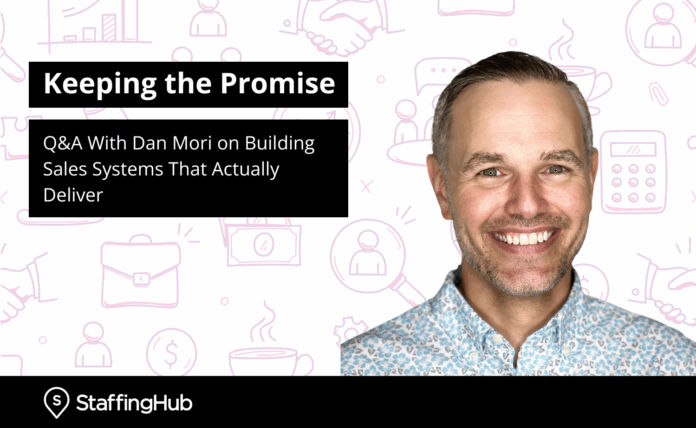
As one of staffing’s go-to experts on modern sales strategy, Dan Mori, founder of Staffing Mastery, Staffing Dashboard, and the Staffing Sales Summit, has spent years helping agencies bridge the gap between what salespeople promise and what their teams can actually deliver.
At this year’s Avionté CONNECT conference, where Mori led a workshop on building structured sales systems that convert, we sat down to discuss the fundamental shifts required to move from commodity vendor to strategic partner. From the critical importance of defining your unique value proposition to why curiosity beats charisma in today’s market, his insights reveal how the best agencies are rebuilding their sales approach from the ground up.
Q. You’re speaking at CONNECT this week — what kind of energy or themes are standing out in your conversations with other attendees?
Dan Mori: I love that question. The overall energy is interesting. There’s a dynamic, obviously with the passing of Rishabh Mehrotra, who was an incredible human being. But in true Rishabh fashion and being an amazing leader, the energy is strong. I think it’s actually created a connectivity amongst the people. So the energy is really good.
We’ve been in three years of really hard times in staffing, and there’s no instant light at the end of the tunnel. There is no quick fix. In all the sessions I’ve been a part of so far this morning, there is a concentrated theme around this major structural shift. We’re in a sea of uncertainty and people are scrambling for answers. And when I listened to Chris Ryan deliver the keynote masterfully today, when I saw him talk about all of the things that are really consuming people’s thoughts, I kept thinking, There is so much opportunity here for staffing agencies to grab a hold of this and understand how to navigate this.
Even when I was sitting in on Tom Erb’s session talking about how to create a high-performing organization, he hit on some of these same topics about how you need to be able to differentiate yourself through the process.
I think this conference is creating the opportunity to learn how to better position yourself to be the staffing agency of tomorrow.
Q. You’ve said buyers today often feel disappointed, not by price but by unmet expectations. Where are most agencies going wrong — and how can they fix it?
DM: There are two pieces there I really want to emphasize. The first one is that buyers are disappointed. They talk about price, but they’re using that to communicate their disappointment with value, because at the end of the day that’s really what they want. They want somebody reliable to show up and do the job that their company needs done to be successful. That’s what they want from us.
And unfortunately, all too often, that’s what salespeople promise. So when the buyer buys the promise of the salesperson and they don’t deliver, they’re let down and it creates frustration and that leads to the second point.
The biggest gap that I see in the staffing industry, by and large, is that salespeople don’t actually sell what the staffing agency does. They’re out there trying to get a new client, trying to get an order, and they promise, and they promise. They say all the platitudes of, “We’re the best agency. We deliver the best talent. We’ve got great customer service. We’ve got the technology and access to all the job boards and recruiting tools.” They promise all those things and that’s what the buyer buys because that’s what they want to believe. Then they take the order back and they drop it on the recruiters’ desk and say, “Here, fill this.” And the recruiter says, “We don’t have these candidates. We don’t specialize in this.”
And what’s happened is, because agencies are not putting in the work to clearly define who their ideal client is and identify the unique value proposition they should be offering to that client, salespeople are left selling vaporware. They’re left selling hopes and dreams and smoke and mirrors. And then the recruiters are the ones who are left picking up the pieces.
What agencies should be doing is taking a really deep look in the mirror, like what Chris mentioned this morning, and say, “Hey, what are we good at and what are we not so good at?” Clearly define what good means to you as an agency, and if it doesn’t look the same as your competition, that actually makes you better. It’s counterintuitive, but it makes you better to know exactly what you’re good at and only pursue and only accept good business.
If I’m sitting across from a salesperson and I ask them what makes you different and they answer, “We don’t take every order. We only work on the orders that we know that we’re going to be great at. And if we don’t think we can fill it, we’re going to tell you front and center, and we might even refer you to someone that might be better at filling a particular order than we are.” I’m going to like that agency, I’m going to like that salesperson, and I’m likely to give them my business without haggling on price.
Q. What’s the most common mistake agencies make when trying to differentiate — especially in the early stages of the sales process?
DM: The most common mistake is selling too early. If you want to differentiate yourself, the first step is understanding what actually differentiates you. What is your UVP (unique value proposition)? Understand how to communicate that to your ideal prospect in a way that connects with them.
As the sales rep, you should be preparing for your meetings knowing, “What type of prospect am I going to see? Who is the buyer? Who are the influencers? What are their pain points or gaps in staffing and employment? What key questions can I ask to find out how my service delivery can help solve that problem and deliver that end result.”
Because they don’t do that prep work, which is the most important first step, they start asking generic big questions like, “Do you ever have staffing issues? Are you always hiring? Do you face high turnover? Do you work with other staffing vendors?” And they’ll respond with, “Yeah, we work with other vendors. Yeah, we face high turnover.” They don’t actually take the time to understand why that’s the case or what business impact that’s actually having. They just jump right into selling, “Oh, well, I can solve this problem for you, Mr. Customer or Miss Prospect, if you work with our agency. If you have turnover, choose us, we’ll solve that problem for you.”
They don’t take enough time and they don’t value the process enough to understand how they can actually solve the problem. There’s not enough discovery of what the prospect really wants from a staffing partner these days, because it has evolved. It just leads to poor salesmanship, not ideal clients, and, honestly, not ideal orders.
And then again, the recruiters are the ones left having to figure out how to make it work, oftentimes letting the client down.
Q. You’ve warned against overrelying on job boards. What’s a more strategic approach to sourcing — and how should agencies be leveraging their database to stay competitive?
DM: This is my disclaimer because everything I say after this might not lead to this opinion: Job boards are an important part of sourcing. They are a necessary part of sourcing. However, it is important to understand that job boards are filled with the most active job seekers on the market. They’re not only applying to your jobs — they’re applying to your client’s jobs, so you’re competing with them and you’re looking at the same candidates.
If you’ve ever submitted a candidate and you got to the offer stage, and all of a sudden the client says “we’re already talking to them” or “they’re already in our database” and they pull it from you, you know what I’m talking about. It’s because they’re the most active, accessible people. They’re the low-hanging fruit. That doesn’t make them bad candidates, it just makes them the most active. And what do we know about active job seekers? They’re the ones that hop the most, right? So that’s really not what your client wants. In fact, if that’s what they want, they’ll just go directly to the job board because they have the same access that we do.
So, job boards are an important piece of it, but they can’t be the dominant piece. If you want to provide value to your client, you have to provide a candidate that they can’t readily get or easily access. How do you do that? Passive talent.
We’ve heard about this for years. This is not new. However, the work that it takes to get to passive talent, it’s harder. But here’s the deal: That’s what being a value partner takes. That is the cost of admission to being a good strategic partner. If you want to be a commodity, post stuff on job boards for your clients. If you want to be a valued partner that they’re going to pay a premium for, have a more balanced sourcing strategy.
There’s probably more than this, but I look at four key areas that I think are the main pillars of sourcing. Job boards are part of that. However, you have to get into passive talent and where passive talent comes in is employee referrals. You absolutely need to be leveraging your network. I will come back to how this hits on the database piece.
You also need to do talent mapping. You need to be very specific about who are the qualified employees in the market that you can call on, build a relationship with, and then move from their current job over to one of your client’s roles. That’s talent mapping. That’s the fundamental recruiting skill set.
I also love companies that look at e-commerce and use website tracking. They understand who’s visiting their website, what job ads they’re looking at, and how to follow those people around with some pay-per-click retargeting. That’s another pillar that e-commerce has done forever. If you’ve ever talked about a product inside your house, eventually your phone is going to start showing you ads for that, and you’re going to start seeing it more and more. It creates this awareness and eventually you’ll buy. Staffing companies need to be doing that today.
So how do all these four pillars feed into the database? You should be looking at every single one of these to bolster your database and make sure you have good data hygiene practices. But I like to look at job boards as being the backfill. I want to make sure that I’m getting passive talent into my database that gives me a unique advantage in the marketplace. I’m building relationships with these people. They know who my brand is. So when I reach out to them with a job, they’re not like, “New phone, who dis?” They know who you are, and you can place them. Then you’re backfilling those candidates with those active job seekers from job boards.
That’s how I would look at using a database to be more effective for your customers and also provide a unique value that your prospects and clients will want.
Q. What’s one belief or habit you had earlier in your sales career that you had to unlearn — and what replaced it?
DM: When I got started in this industry, I had no business being in staffing sales. I had some sales experience, but I sold a commodity product to a consumer, and I sold it to people that came to me.
When I got into staffing, I had to sell a service that’s not a commodity, even though it’s viewed as such, but it should not be if you’re solving strategic problems, right? I had to sell a service to businesses that weren’t coming to me. So it was a complete 180. It was really hard, and I was not equipped for it.
But what I used to do — and sadly, a lot of salespeople still do this today — is go in without a plan. I felt like my ambition and charisma could carry me all the way to where I wanted to go. And I honestly thought that just showing up was enough. As I sit here and admit that to you in this interview, it’s a little bit embarrassing, frankly, but that’s what it was. It was driven by ego: “Oh, I can go do this. I can sell anybody.” I just believed that just showing up and relying on my own charisma and hustle was enough.
I realized that when times are easy, you might get by. But when you face a little bit of adversity, like we’ve been facing over the last three years, that is not enough. I had to get my ego in check. I had to tell myself that curiosity is way more important. I had to tell myself that I didn’t have all the answers and shouldn’t go in assuming I have the answers.
If you look at it from a high enough level, most of our clients face the same problems, have the same negative business impact, and want the same outcomes. That being said, when you’re sitting across from a prospect, what they’re experiencing is unique to them. It could be a mere situation with you and another client that you have, but it doesn’t feel that way to them.
So I had to sit back and realize I don’t have the answer to every solution just because I think that I’ve dealt with it before. I have to show up and understand how to diagnose this, because that customer is facing something that’s adding stress to their lives. They’re having a real negative business impact and likely a personal stressful impact that’s going on.
For me to treat that with the proper care needed, I needed to leave my ego and assumptions behind, ask good questions, and understand. I had to have the humility to say, “You know what? I’m sorry, I’m not the right person to solve this for you.” And I had to build relationships with competitors and say, “Hey, you know what? I see you’re pretty good at this and I’m not. If I run into this situation, can I send somebody your way?” No strings attached. It took a big adjustment for someone who started out as an egotistical salesperson.
The last thing was I needed systems, something that could scale, that would help me focus and be consistent in my effort. And that’s a little bit counterintuitive to most salespeople. A lot of salespeople like to run fast and loose and rely on their own charisma.
So I had to check a lot of that emotional stuff and start treating business like business, use systems, and use curiosity. I had to truly understand what my clients wanted me to be for them, then let them know if I could be that. And if I could, the match was amazing, the relationships were great, the price was fine, and the margins were good. But anytime I tried to be something that I wasn’t equipped to be, we fell flat on our face and it was a bad look for me. It was demoralizing for the recruiters and it was a bad taste for our clients.
Simply put, have systems and know who you are. Be that and don’t be something that you’re not.
Connect with Dan Mori, explore Staffing Mastery‘s sales training programs, and learn more about sales strategies that drive results in his episode of The Staffing Show.
Interested in attending CONNECT 2026? Follow Avionté for updates.







